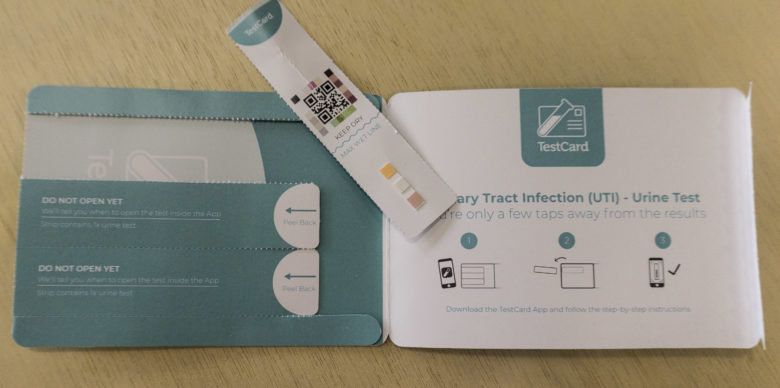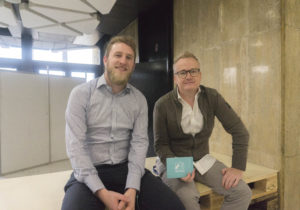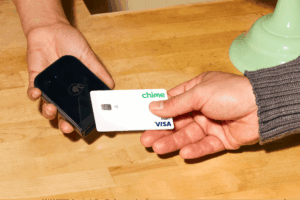Home Diagnostics Startup TestCard Has Just Raised €1.8M to Revolutionize Personalized Medicine

TestCard, the UK based, but initially funded and also technologically developed in Bulgaria medtech venture, has received another £1.6M (equals €1.84M) to continue the development of its home diagnostics product. The startup brings together traditional physical urine tests and smartphones. Thus, it provides DIY testing for pregnancy, urinary tract infections, blood glucose, and illegal drugs. Founded in 2017, Testcard has already filed several patents for its technology.
A significant part of the £2.5M round that is yet to be closed, comes from a current investor – the Bulgarian fund Neo Ventures, at a pre-money valuation of £12.5M. “I believe TestCard has the potential to revolutionize personalized diagnostics, especially being approved by a regulatory authority,” says Pavel Ezekiev, managing partner of the investment company.
Diagnostics in the pocket
“Around 80% of the women get urinary tract infections (UTI) once a year. Instead of going to the general practitioner and getting a prescription, you can now do the test at home, send it to the pharmacy which would usually have a doctor on demand, and get your medicals delivered,” explains us Luke Heron, co-founder and CEO of TestCard. According to him, mass adoption of the product could save up to £500M from unnecessary bed admissions for UTIs yearly only in the UK. Translated into users’ individual costs – once the urinal test “postcard” is on the market this summer at a price of £5, it would be a much cheaper and quicker alternative of the doctors’ visit. The mobile application that reads the results is free to download.
How does it work? The user scans the QR code on the chosen strip once peeled off, so the app knows which test has been done. The smartphone indicates the time needed for the test to develop result. With a flashlight, it notifies the user when is time to scan the results’ bar. The phone cam reads the colors on the test strip, then in several seconds the result is on the screen, and ready to be sent to the doctor or pharmacy.
Ready to launch
This summer TestCard is launching on the UK market, it’s already preparing diabetes testing on the Indian market together with AETNA, one of world’s largest medical insurance companies. The company will then roll out in more countries, predominantly emerging markets, as it’s part of its mission to bring affordable med solutions to those economies. The paper peel-off cards could be found in pharmacies and directly purchased online.
According to Heron, the National Healthcare Service in London is partnering and will make the TestCards available to the 2.5M residents later this year. Also, AETNA is rolling it out in India, Thailand, and the Philippines. After that the product will be available on more markets in Europe, the co-founder says. They are also expecting to sell in the US in 2020.
USP – usability of the mobile application
“It actually all started in a conversation with my co-founder Dr. Andrew Botham and with the idea to find a convenient solution for men experiencing prostate problems and being bad at going to the doctors. We, however, decided to first go for the lower hanging fruit,” tells us Heron.

In two years, TestCard will roll out also gonorrhea, chlamydia, malaria and, possibly, prostate conditions, including cancer, also prostate-specific antigen tests that are normally done from the blood. The chemistry which TestCard uses is nothing innovative. The history of urine test strips goes back to 1950, and global diagnostics equipment company Roche launched strips for several conditions in the mid-60s. These are all already regulated methodologies and materials.
What makes TestCard unique is the ability of the algorithms, indeed developed in Plovdiv, Bulgaria, to read test results regardless of lightning and quality of the smartphone camera.
The fact that their app could read the result as accurately as professional equipment (recently confirmed by Roche) even if scanned with one hand in a darker room a.k.a the usability is the company’s USP. Thus, it hopes to beat its direct competitors Healthy.io and Inui Health. This is also what the patents are filed for.
Still, the product in its whole needs to get the CE mark for medical devices (certification for safety) to sell in the UK and the EU. “This should be finished by the end of this month,” says the CEO.
Home diagnostics revolution
With a team of eight full-time people, TestCars is entering a huge market. “If they make it on the Indian market, this company could make up to £25M in three years,” predicts Ezekiev, whose fund led the seed round of £1.3M in 2018.
“The market globally is still small and led by pregnancy testing. Yet when you combine it with UTIs and diabetes it’s a market that is worth hundreds of billions”, estimates Heron.
In the next 12 months, the company will probably move its postcard manufacturing to Mumbai, India which will significantly reduce the cost of production and increase its margins. Financial performance, however, is not everything. “As every founder dies I have this delusional ambition to disrupt the healthcare globally and positively impact emerging markets where healthcare is not as accessible and affordable,” states Heron.





























